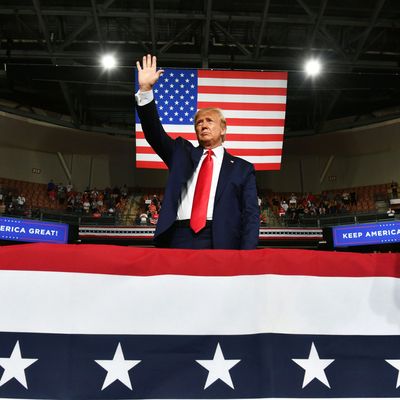
Conservatives are permitted to concede some flaws here and there in Donald Trump’s job performance without risking their good standing in the movement: His social media habits are the safest target, along with his trade policies and indulgence of domestic spending. The more daring critiques might acknowledge his crass behavior and less-than-perfect impulse control. But acknowledging Trump’s racism is almost verboten. If Trump is a racist, then the party’s voting base is also racist, and its elected officials are complicit in the country’s founding evil.
Manhattan Institute fellow Heather Mac Donald comes to the president’s defense in a new Wall Street Journal op-ed (“Trump Isn’t the One Dividing Us by Race”). Mac Donald has devoted her career to the proposition that anti-white racism is a far more serious problem than anti-black racism, and her latest effort represents the state of the art in Trumpian racial apologetics.
“Mr. Trump rarely uses racial categories in his speech or his tweets,” argues Mac Donald. Rather, it is Democrats and the liberal media “who routinely characterize individuals and groups by race and issue race-based denunciations of large parts of the American polity.”
Mac Donald’s premise is that racism is defined by overt reference to racial identity. She provides several examples of reporters and Democrats committing such offenses. A Washington Post news story noted that a recent debate consisted of “10 white Democratic candidates”; various reports have described Trump’s rally audiences as “overwhelmingly white”; Kirsten Gillibrand said “whiteness is what protects” white people from mistreatment by police, and so on.
Conservatives usually posture as defenders of hard-bracing truths and open discourse, but here Mac Donald recoils from simple factual descriptions. She is not denying that the Democratic debate happened to consist of all white candidates, or that white people are disproportionately represented at Trump rallies. Yet these facts offend and discomfit her.
Mac Donald’s definition of racial divisiveness requires explicit reference to race. As long as you’re using race-neutral terms, like “states’ rights” or “local control,” Dr. Mac Donald will give you a clean bill of health. Of course this lenient standard would absolve some of history’s most notorious racist demagogues.
By limiting the categories for racial incitement to “speeches and tweets,” Mac Donald allows herself to ignore vast swaths of Trump’s career, which began with systematically excluding African-Americans from his father’s housing complexes. The discrimination was overt: The Department of Justice conducted A/B tests in which black applicants would be told there were no vacancies, and then white applicants offered rooms for rent. Trump’s experience defending his father’s discriminatory practices, hiring Roy Cohn and fighting the Department of Justice for years without conceding error, formed the template for his methods.
She likewise ignores Trump’s obsession with falsely accusing the Central Park Five of rape, and Barack Obama of having faked his birthplace — both smears Trump has refused to renounce. Likewise, Trump’s crusade to block a Muslim cultural center from lower Manhattan on the basis of associating all Muslims with Al Qaeda does not merit attention. And she can avert her gaze from Trump’s long record of private racist comments, since those are also not speeches or tweets. MacDonald defends what she calls Trump’s “nonracial denunciation of Baltimore’s leadership.”
In fact, Trump was attacking U.S. Rep. Elijah Cummings, who is not responsible for municipal governance in Baltimore, and summoned images of rats and infestation. Those attacks closely mirror what Michael Cohen testified Trump had said in private (“While we were once driving through a struggling neighborhood in Chicago, he commented that only black people could live that way”). But since that was not a speech or a tweet, and since the public version of Trump’s attack on Baltimore did not actually use the term “black people,” neither qualifies as a racist remark.
And yet, amazingly, even after Mac Donald has set the bar at ground level, Trump has repeatedly tripped over it. As a candidate, Trump has claimed a Mexican-American judge is unfit to do his job on the basis of his identity (“sort of like the textbook definition of a racist comment,” Paul Ryan called it, back when Ryan expected Trump to lose). He called for a ban on Muslim immigration. He called for the deportation of nonwhite Democrats in Congress and led a “send her back” chant.
Mac Donald does not even attempt to explain away these statements. She implicitly concedes the racism in her less-than-categorical statement that Trump “rarely [italics mine] uses racial categories in his speech or his tweets.” Given that historically, American presidents never use racial categories in their public remarks, this is a bit like saying O.J. Simpson rarely murders anybody.
The most astonishing turn in Mac Donald’s argument comes at the very end. She acknowledges that overt white supremacists have been emboldened and carried out several terrorist attacks. MacDonald blames this on … leftists in media and the academy. Progressives are “creating a group of social pariahs, a very small percentage of whom — already unmoored from traditional sources of meaning and stability, such as family — are taking their revenge through stomach-churning mayhem,” she argues. “Overcoming racial divisiveness will be difficult. But the primary responsibility rests with its main propagators: the academic left and its imitators in politics and mass media.”
Bear in mind that white nationalists themselves are very explicit about their admiration for Donald Trump and their belief that the president is inspiring the white nationalist cause. Yet MacDonald not only denies this linkage, but inverts it, placing responsibility on the people who call Trump racist. What’s convenient about this bit of reverse logic is its endless applicability. The more Trump inflames racism, the more his critics cite that racism, and therefore the more support Mac Donald can find for her theory that the major problem in American life is conservatives being called racist.






























